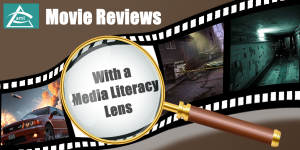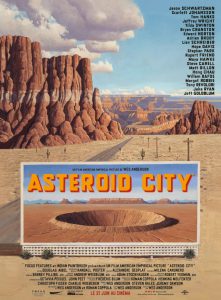Movie Review: Asteroid City (2023)
Movie Reviews with a Media Literacy Lens: Asteroid City (2023) by Mary Maliszewski
When I went to watch Asteroid City on its opening weekend, I had no idea what to expect. I’d been seeing advertisements for the brightly-coloured dramedy since mid-April, but these seemed deliberately misleading, at least to my suspicious eyes. The trailers showed Jason Schwartzman, wearing a khaki jacket and a scruffy beard, wandering around a desert landscape and talking about aliens.
That can’t be all that this movie’s about, I thought. Can it?
Though I had only seen two Wes Anderson films at the time — 2009’s Fantastic Mr. Fox and 2014’s Grand Budapest Hotel — I knew enough about the director’s career to distrust these deceptively simple trailers. Wes Anderson makes movies the way that Russian craftsmen make nesting dolls: with many layers standing between the viewer and the core.
I also knew that criticisms had been levied against Anderson in recent years. After the release of The French Dispatch in 2021, audiences had begun to question his filmmaking philosophy, calling his work pretentious, repetitive and, in the words of Vanity Fair’s Richard Lawson, “difficult to grasp onto”.
With these facts in mind, I tried to watch the movie with an eye toward both plot and aesthetics. Would one prevent me from seeing the beauty of the other? Was there any beauty to be seen at all? These were the questions that I aimed to answer.
The film’s main story is easy enough to summarize. Widowed war photographer Augie Steenbeck (Schwartzman) comes to the titular city to attend the Junior Stargazer convention, where his teenage son Woodrow (Jake Ryan) will be honored for his scientific achievements. Joining Woodrow are four other teen geniuses, including Dinah (Grace Edwards), the daughter of world-weary film star Midge Campbell (Scarlett Johansson).
As more visitors arrive and the convention gets underway, the commencement ceremony is disrupted by the sudden appearance of a UFO. Under orders from the president, visiting general Grif Gibson (Jeffrey Wright) places Asteroid City under military quarantine, forcing the mismatched group of tourists and townsfolk to live together until the quarantine is lifted.
Complicating this is the fact that these events are fictional, not only to the audience, but within the context of the film. Every so often, the quarantine narrative is interrupted by the story of Conrad Earp (Edward Norton), a brilliant playwright working on a sci-fi epic: the very same sci-fi epic that the audience is currently watching. These digressions are, in turn, intruded upon by a Rod Serling-esque narrator (Bryan Cranston), who details Earp’s writing process and behind-the-scenes struggles.
While some viewers might find these interwoven stories just as opaque as Anderson’s previous works, I personally found them quite touching. For me, the scene where a frantic understudy begs Midge’s actress to return to the production carried the same emotional weight as the character’s complicated relationship with Augie. One moment near the end of the film, where the lines between the actors and their characters had begun to blur, even brought me to tears.
Moreover, the movie makes it clear that Anderson has an immense respect for the sci-fi genre, as well as the medium of theater. Great care was taken to give the sets, props and costumes the right kind of futuristic flair, and even greater care was taken in depicting the cast rehearsals and brainstorming sessions.
Asteroid City may not be everyone’s cup of tea, but for theater kids, science fiction geeks and fans of quirky filmmakers, it will definitely have something to offer.
Follow-up questions
- How are the conventions of stage plays and cinema used in Asteroid City? How do they convince the audience that the situations they depict are “real”?
- What are the limitations of this medium? Does blending multiple mediums heighten or lessen these limitations?
- What elements are likely to attract viewers? What elements are likely to deter them?
- Does the film contain any commercial or financial implications? If so, what are they?
- Does the film represent the values of the 1950s or the present day? How?
- How is the government represented in the film? What sociopolitical implications does this representation carry?
- Asteroid City takes inspiration from several different genres. Which genres are they and what conventions does it borrow from them?
- How does the film’s aesthetic enhance (or detract from) the story?





